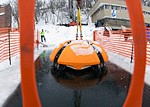Category Science & Technology
Celebrating Leopold’s legacy
To celebrate the Aldo Leopold legacy, people are invited to the Arboretum Visitor Center, 1207 Seminole Highway, from 9 a.m.–12:30 p.m. on Saturday, March 1, for “Madison Reads Leopold,” part of Aldo Leopold Weekend. Leopold Weekend is a statewide event that honors Leopold’s contributions to our understanding of the environment.
Biochemist Kimble elected National Academy councilor
Judith Kimble, a University of Wisconsin–Madison professor of biochemistry and genetics and Howard Hughes Medical Institute investigator, has been elected to a three-year term as councilor for the National Academy of Sciences (NAS).
Can RFID technology promote a safer blood supply?
Radio frequency identification technology, or RFID, has inspired many novel applications of late, including efforts to study magazine reader patterns, access restricted areas, locate stolen vehicles and track luggage at major airports.
Stem cell pioneer James Thomson to steer regenerative medicine at MIR
The Morgridge Institute for Research, the private, not-for-profit side of the Wisconsin Institutes for Discovery, is announcing the appointment of world-renowned stem cell pioneer and researcher James Thomson as the first member of its multidisciplinary scientific leadership team.
Morgridge Institute launches Web site
The Morgridge Institute for Research launched a new Web site today, Feb. 25, 2008.
Campus influenza cases on the rise
Since the beginning of February, there has been a marked increase in the number of students coming to University Health Services (UHS) at the University of Wisconsin–Madison with influenza-like illness and laboratory-confirmed influenza.
Off the hook: Stronger soft-plastic fishing lure reels in raves
Working with University of Wisconsin–Madison engineering and business school faculty and students, a Wisconsin entrepreneur has perfected a fiber-reinforced fishing lure that may prevent millions of pounds of toxic plastics from polluting waters nationwide.
‘Mini conference’ on Wisconsin Union Initiative set for Feb. 25
The Wisconsin Union announces a “mini conference” to formally kick off the start of the Wisconsin Union Initiative, a project to build a new “green” south campus union and restore and upgrade Memorial Union.
Genetic pathway critical to disease, aging found
The same chemical reaction that causes iron to rust plays a similarly corrosive role in our bodies. Oxidative stress chips away at healthy cells and is a process, scientists know, that contributes to a host of diseases and conditions in humans ranging from Alzheimer's, heart disease and stroke to cancer and the inexorable process of aging.
Hot subjects—Civil and Environmental Engineering 679: Travel Behavior Analysis
From the moment people step outside their homes to the moment they return, civil and environmental engineering professor Jessica Guo is…
Two UW–Madison engineers elected to national academy
Two University of Wisconsin–Madison College of Engineering faculty members are among the 65 engineers and nine foreign associates elected to the National Academy of Engineering (NAE) in 2008.
Hot subjects—Horticulture 375: Organic Agriculture Colloquium
After two years of teaching an experimental colloquium on organic farming, horticulture professor Jim Nienhuis is no longer surprised by the diversity of majors interested in his class.
The key to quieter Atlantic hurricane seasons may be blowing in the wind
Every year, storms over West Africa disturb millions of tons of dust and strong winds carry those particles into the skies over the Atlantic. According to a recent study led by University of Wisconsin–Madison atmospheric scientists, this dust from Africa directly affects ocean temperature, a key ingredient in Atlantic hurricane development.
Study: Religion colors Americans’ views of nanotechnology
Addressing scientists in Boston Feb. 15 at the annual meeting of the American Association for the Advancement of Science, Dietram Scheufele, a professor of life sciences communication, presented new survey results that show religion exerts far more influence on public views of technology in the United States than in Europe.
Edil receives Turkish science award
In a January ceremony held at the presidential palace in Ankara, Turkey, and attended by Turkish dignitaries, including the president, president of the parliament, prime minister, cabinet ministers, university presidents, and others, University of Wisconsin–Madison Civil and Environmental Engineering Professor Tuncer Edil received the Special Science Award from the Scientific and Technological Research Council of Turkey.
Researchers promote coexistence of wolves, people
For almost a decade, Adrian Treves, an animal behaviorist and ecologist, and Lisa Naughton, a social scientist, have worked closely with the Wisconsin Department of Natural Resources to address the challenges of living with wolves, especially the losses of livestock and hunting dogs that inevitably result.
Faculty conflict of interest issues probed at WARF Gilson Discovery Series
Conflicts of interest for university faculty members who start their own companies will be the subject of a panel discussion on Monday, Feb. 18 at 5 p.m. at the University of Wisconsin–Madison Fluno Center, 601 University Avenue.
Catheterized system wins annual student creativity prize
A catheterized system to sense bladder pressure and control urine flow to prevent incontinence won the $10,000 top prize in the Schoofs Prize for Creativity, an annual University of Wisconsin–Madison invention competition.
Recent sightings: Icy test drive
Photo: Jeff Miller An underwater robot is lowered by crane into an opening cut in the ice covering…





